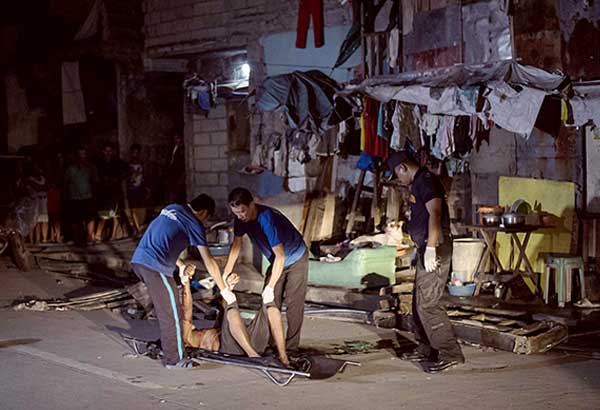Study: Government war on drugs may have involved vigilantes

MANILA, Philippines — The number of drug-related killings by unidentified assailants closely tracked the number of deaths arising from police operations, a study on the first months of the government's war on drugs shows, suggesting the crackdown on narcotics involved both cops and vigilantes.
According to data gathered by Drug Archive Philippines during the 16-month period from May 2016 to September 2017, there was a clear pattern of surges in killings and periods of relative silence depending on official government pronouncements on its war on drugs.
"These incidents underscored the fact that the anti-drug campaign involved not just official police operations but also some form of vigilante action," the study noted.
The study showed that there was a high rate of deaths from May to September 2016, Duterte's first few months in power. There was a relative drop following this period, but there were days when more than 10 deaths were recorded.
Deaths drop after Jee Ick-joo killing
The first sustained drop in the number of killings happened in January 2017 when the government's anti-drug crackdown was suspended following the discovery of the murder of a Korean businessman in October 2016 by police inside the police national headquarters in Quezon City.
When the crackdown was reactivated on March 6, ten people were killed the following day, according to the report.
"These recalibrations in government policy are revealing because the bulk of the deaths follow the period of intense government-led operations. Yet, during the same period, a considerable number of deaths were not from police operations, including body dumps," the Drug Archive Philippines study said.
It said that the "curious coincidence" between government decisions to scale down anti-drug operations and the intensity of death incidences highlighted questions on the role of government in the killings.
Duterte won the 2016 president elections largely on a strong anti-crime and anti-drug platform. During the campaign, he promised a bloody crackdown and warned that fish in Manila's iconic bay would be fattened by feeding on corpses of drug suspects.
Since the campaign's launch, thousands have been killed in the campaign, mostly from urban poor communities.
The study said that the casualty count since mid-2016 could reach as high as 25,000 based on government statistics.
According to the police, around 4,300 were killed in their operations while over 22,000 deaths could be linked to drugs.
Drug Archive Philippines is a project of a research consortium led by the Ateneo De Manila University, De La Salle Philippines, the University of the Philippines, and Columbia University's Graduate School of Journalism.
It collected data from media reports and accessible court filings about the deaths of 5,021 people from May 10, 2016 to Sept. 28, 2017.
Palace questions study's data
Harry Roque, a spokesman for Duterte's office, questioned the reliability of the study's data considering that these were taken from media reports.
In an interview with DZMM radio, he said that although he was not questioning the socio-economic background of the victims it would have been better of the researchers probed into individual cases to ascertain if they were drug-related.
Based on the data, the consortium discovered that the majority of the victims whose occupations were known had low-paying, low-skilled work.
"Based on their place of residence or their occupation, it is clear that most of the victims were poor," it said.
It also added that only a few of those killed were known big-time drug dealers and a good number or 1,149 were on the so-called drug watchlist.
Forty percent of the killings happened in Metro Manila although only 13 percent of the Philippine population resides there, the study noted.
Killings in Manila, Quezon City and Caloocan comprised 61 percent of all deaths in the National Capital Region and almost a fourth of the nationwide toll, the research found.
According to the gathered data, the primary reason cited by police for the deaths was that the suspects offered violent resistance.
The consortium also raised concern over the large percentage of killings occuring in homes, regardless whether the operations were done by the police or by unidentified assailants.
"The killing of suspects in private homes during official police actions raises important issues of accountability and the effectiveness of official police policy in conducting such operations," the study said.
- Latest
- Trending




























